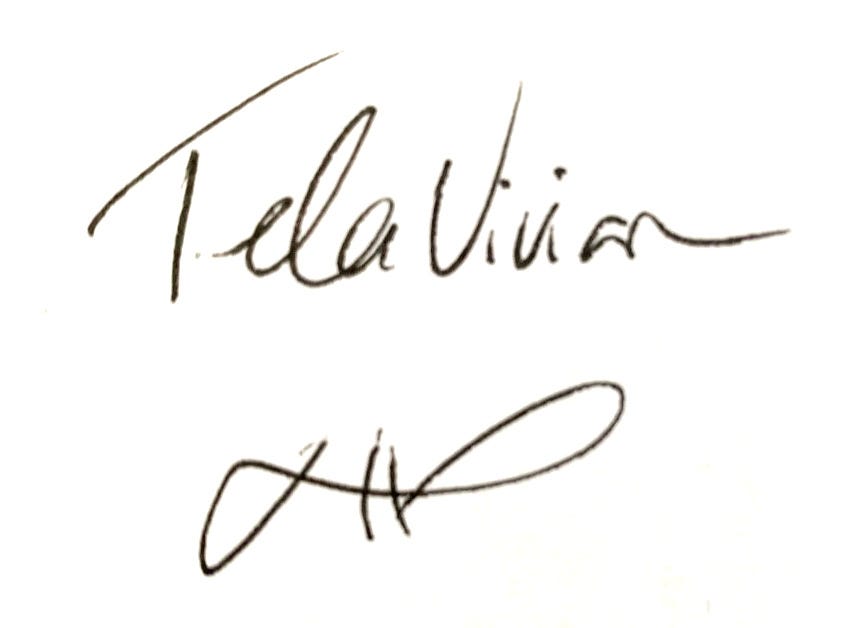Syria. STLV. Israel. Canada: What Do They Have in Common?
Change is Everywhere
I’ll begin with Syria. Because.
(And within minutes of updating this short piece I will let it go live on the site - before it is outdated yet again.)
It is 4:07 pm on Sunday afternoon in Israel and this broadcast by a rebel leader from the Syrian state broadcasting studio was just posted on “X”. You can watch the very composed delivery by the man in the clip here. After 50 years of brutal dictatorship headed by members of the al-Assad family, change is upon Syria.
Control of mass communication facilities typically sounds the death knell for teetering regimes. And so it is with the now former Syrian President Bashir al-Assad.
One week ago, the rebels had just begun their assault on Aleppo and Homs. Last night, Damascus fell. The fate of longtime despot and President, al-Assad, remains unclear. There are reports of his Prime Minister having been captured by the rebels and escorted - while speaking on his cell phone - to the Damascus Four Seasons Hotel. All very civilized conduct, on camera, for now.
Overnight, Russia initiated a somewhat hurried evacuation of its main airbases in Syria. We are seeing video clips of stunned Damascenes walking, slack-jawed, through the al-Assad private mansion. It is not your typical middle eastern dictator’s home. The minimalist, western decor and architectural style was likely heavily influenced by al-Assad’s London born and bred wife, Osma.
Somewhat surprisingly, people walking through the mansion seem more curious than anything. A few ─likely members of the same family─were videoed carrying armloads of presidential china dishes, smiling like Cheshire cats. But original paintings and other fine objets d’art and excess were left untouched. And it all seemed to have a giddy air. Not violent at all.
It was a very different vibe in the Embassy of the Islamic Republic of Iran, which has been taken over by rebels. Again - I suggest that all reports must be treated as being unreliable - in varying degrees - at this very volatile stage. However, based on posted video, the Embassy site seems to have been more violently looted, with bullet-riddled glass windows and various bits of office equipment strewn about inside and on the pavement outside the premises.
To my knowledge there is no western press on the ground in Syria reporting and we are relying on Telegram channels and other social media for information that is not immediately verifiable. But I think we’re getting a reasonably clear picture of what’s going on. Regime change.
What is less clear is exactly who controls Syria and who controls them. Some bizarre “reporting” going around today so I’m hoping we have more clarity in the coming 24 hours. But we do know that the dominant faction leading the rebels collectively is an offshoot of the Islamist al Qaeda jihadists, formerly led by Osama bin Laden. This lesser known group - which is very much local to Syria - is called Hay’at al Tahrir al-Shan, or “HTS”. Early reports (again, not verified) indicate that Christians residing in Syria may be targeted by this new regime and that they have been warned that their homes will be searched in the coming days. Fewer than 2% of Syria’s population of approximately 20-million is of the Christian faith.
STLV will be speaking tomorrow with one of our regular political/security/military analysts and longtime friend of the podcast, Ya’akov Katz. The plan is to edit and publish his analysis of Syria and beyond quickly, meaning Monday evening EST or early Tuesday morning.
Three years ago, I was deep into the planning for the launch of State of Tel Aviv.
May 17, 2022, for the written version. February 2023 for the podcast.
Within months of our launch, the results of election #5 in Israel (in a two year period) ushered in what has been a constant state of ever-heightening tension and, not infrequently, chaos. From January 2023 until October 7 of that year, domestic friction intensified without pause. There was a sense of urgency; that if there is not a formidable civil society response to what many perceived to be an extremist coalition from the outset, that the democratic nature of Israel may be irrevocably altered.
PM Netanyahu and the coalition partners demeaned the protesters as leftist anarchists. Traitors. Old elites clinging to the vestiges of their former glory. The protesters would have expressed their position as relating to profound concerns that Netanyahu’s coalition had a legislative agenda that would weaken the democratic institutions of modern Israel.
Protests were constant, sometimes violent, always draining. As Yossi Shain, Professor of Political Science and Government at Tel Aviv University and Georgetown (a man with many titles, including former MK and friend of State of Tel Aviv) remarked to me, presciently, in the years leading up to election #5…..”In this country”, he said, “people have been asleep since the mid-80s. On autopilot. Just wanting to live a more ‘normal’ life and choosing to ignore the clear signs of a looming catastrophe.” Jew vs Jew. Secular vs ultra-orthodox. Ultra-orthodox vs the state. Religious Zionists vs everyone. Jews vs Arabs. Arabs vs Arabs. It was, one might say, a dynamic environment.
And then, of course, October 7 happened. And the world changed.
In the same period, the digital communication environment has also changed significantly. People read far less than they did even 20 years ago. And when they do read, they prefer for it to be short and snappy. Many factors have influenced that shift but as I see it, the main catalyst is the digital culture that has overtaken our lives. It is the sensational post or sound bite that dominates news cycles and the way in which information is presented.
State of Tel Aviv has modified its form and content since its launch in order to accommodate very rapidly shifting consumer preferences. Some people—but a shrinking cohort, in my view—prefer to read. Many are more inclined to receive content in audio podcast form. Some prefer a written transcript to an audio podcast. And in the last year there has been a significant shift. The market is telling content providers that it wants the full audio-visual experience.
And so, ever agile, State of Tel Aviv will soon be adding to the product menu to accommodate this preference. We plan to do a “soft” beta launch in the next few weeks, and then in the new year it will become a regular feature of the site.
We would love your feedback as we move into this new territory. I must say that I do have a preference for the audio podcast thing. I’ve found a groove. Being “camera ready” isn’t a concern. I could do without the whole makeup and hair bit. But, hey. The sacrifices we make for the cause.
For quite a while I’ve been encouraged by STLV patrons and friends to make this leap—so here goes.
It’s a touch unnerving—which isn’t a bad thing. And overall quite exciting. We’ll see where it all leads.
In the coming weeks we have some superb podcast and print content, including an almost-finished longer podcast piece on the chaos in Canada, the Oxford Union fiasco, a deep dive into the Israeli economy with a former Governor of the Bank of Israel, and more.
It is a rare moment when global attention is fixed on Canada, which has been the case now for some time. And it is not for a good reason.
I am constantly asked these days – what the heck is going on there? In the longer podcast, I’ll do my best to respond to that question and more.
Just over two weeks ago, on Friday, November 22, Montreal was the scene of violent riots. Officials—like the Mayor, police chief—decided that the keffiyeh-masked crowd was expressing “anti-NATO” anger. This, of course, was fiction. The rioters burned cars, smashed windows, and coursed violently through the downtown area. They also chanted for the final solution, intifada, revolution, and river to the sea. The usual hateful, antisemitic, anti-Israel repertoire.
Israeli PM Benjamin Netanyahu was burned on a Montreal street in effigy. Not sure there’s any - even remote - connection between that grotesque act of “protest” and NATO.
Two days later, on Sunday, November 24 in Toronto, a Jewish journalist was arrested by police for “breaching the peace” at an afternoon street protest. Pro-Hamas protesters were on one side of the street and the pro-Israel crowd on the other. The journalist, Ezra Levant, went to photograph the pro-Hamas crew on “their” side, which led to a verbal confrontation with the lead police officer on duty and, ultimately, the journalist’s arrest “for his own safety.”
This bizarre response and the toxic environment that now prevails for Canadian Jews will be the focus of the in-depth podcast to be released this week. I am just waiting, and waiting, on a response from the office of the Chief of Police for Toronto, Myron Demkiw. In the interest of fairness and balance I thought it rather critical to hear from Chief Demkiw himself regarding the approach that he has taken to policing in Toronto since October 7, 2023.
In spite of Canada being home to the fourth largest Jewish community in the world (after Israel, the U.S., and France), it is much more European than North American in character. That also means that the general environment is more unabashedly antisemitic. Furthermore, in contrast to the U.S., social culture in Canada tends to be passive and deferential, reflecting the country’s deep British roots and influences. Stiff upper lip and all.
Clearly, that has changed dramatically in recent years, in large part due to the “open border” immigration and refugee/asylum policy implemented by the successive governments of PM Justin Trudeau. The reality is that the policy seems to be - let ‘em all in - we’ll figure it out later. Events seem to have overtaken Trudeau’s style of governance, which tends to be steeped in ignorance and a shallow, globalist ideology.
I had planned to publish this short piece on Friday, but life got in the way. And I actually unplugged (almost totally) from Friday night to Saturday evening; hoping for a quiet weekend in these parts but always half-prepared for the opposite.
Which, as we now know, is what transpired. With lightning speed, Syrian jihadist rebels deposed President Assad and his regime as I was hosting a lovely outdoor lunch with friends.
A new acquaintance of mine on my kibbutz home, like so many Israelis, does regular reserve service in the army. Since October 7, a large squad of predominantly female officers has fulfilled a critical but grisly role; helping bereaved families through the first week of grieving—from when the dreaded knock on the door comes until the conclusion of the seven-day mourning period for immediate family members following the burial of a loved one. As with all reservists, she holds down a full-time job and is busy with the stuff of life—including raising young children. Mercifully, in recent months, she has been less busy with army duties, and we all hope that this trend continues. Because it means, of course, that fewer soldiers are dying in action or as a result of their injuries.
She was among the guests at my big table on Saturday afternoon for a long, boozy lunch; one of many Israeli traditions that I have embraced enthusiastically. Learning how to pause and truly take the time to enjoy great friends, family, food, and drink is the stuff of life.
So is survival.
Melbourne. Canada. London. Oxford. New York. Amsterdam. Etcetera.
In the lead-up to the launch of State of Tel Aviv in May, 2022, one person with whom I discussed the venture asked me what I would write about that would hold the interest of foreigners.
Of all the uncertain variables, I told him, the one about which I had no concern is the constant supply of content. There is no dearth of that in this part of the world and I am confident in predicting that a surfeit of “what to talk about” will continue for some time.
Thanks for being here. I always appreciate your time and attention above all.
Stay tuned for some really solid material in the coming weeks. And I do hope that wherever you are that things are peaceful.
Signing off, with pragmatic optimism…









